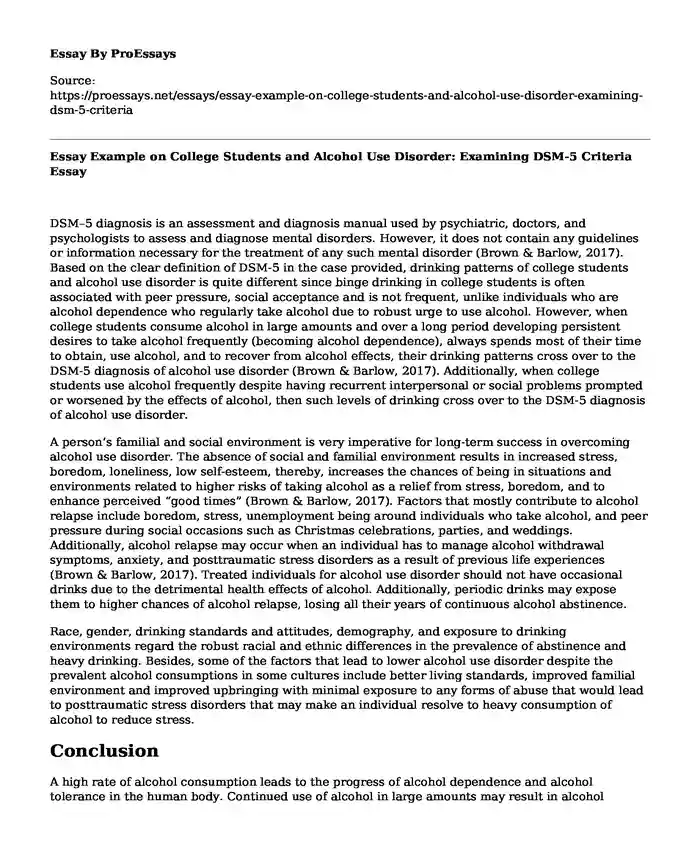DSM–5 diagnosis is an assessment and diagnosis manual used by psychiatric, doctors, and psychologists to assess and diagnose mental disorders. However, it does not contain any guidelines or information necessary for the treatment of any such mental disorder (Brown & Barlow, 2017). Based on the clear definition of DSM-5 in the case provided, drinking patterns of college students and alcohol use disorder is quite different since binge drinking in college students is often associated with peer pressure, social acceptance and is not frequent, unlike individuals who are alcohol dependence who regularly take alcohol due to robust urge to use alcohol. However, when college students consume alcohol in large amounts and over a long period developing persistent desires to take alcohol frequently (becoming alcohol dependence), always spends most of their time to obtain, use alcohol, and to recover from alcohol effects, their drinking patterns cross over to the DSM-5 diagnosis of alcohol use disorder (Brown & Barlow, 2017). Additionally, when college students use alcohol frequently despite having recurrent interpersonal or social problems prompted or worsened by the effects of alcohol, then such levels of drinking cross over to the DSM-5 diagnosis of alcohol use disorder.
A person’s familial and social environment is very imperative for long-term success in overcoming alcohol use disorder. The absence of social and familial environment results in increased stress, boredom, loneliness, low self-esteem, thereby, increases the chances of being in situations and environments related to higher risks of taking alcohol as a relief from stress, boredom, and to enhance perceived “good times” (Brown & Barlow, 2017). Factors that mostly contribute to alcohol relapse include boredom, stress, unemployment being around individuals who take alcohol, and peer pressure during social occasions such as Christmas celebrations, parties, and weddings. Additionally, alcohol relapse may occur when an individual has to manage alcohol withdrawal symptoms, anxiety, and posttraumatic stress disorders as a result of previous life experiences (Brown & Barlow, 2017). Treated individuals for alcohol use disorder should not have occasional drinks due to the detrimental health effects of alcohol. Additionally, periodic drinks may expose them to higher chances of alcohol relapse, losing all their years of continuous alcohol abstinence.
Race, gender, drinking standards and attitudes, demography, and exposure to drinking environments regard the robust racial and ethnic differences in the prevalence of abstinence and heavy drinking. Besides, some of the factors that lead to lower alcohol use disorder despite the prevalent alcohol consumptions in some cultures include better living standards, improved familial environment and improved upbringing with minimal exposure to any forms of abuse that would lead to posttraumatic stress disorders that may make an individual resolve to heavy consumption of alcohol to reduce stress.
Conclusion
A high rate of alcohol consumption leads to the progress of alcohol dependence and alcohol tolerance in the human body. Continued use of alcohol in large amounts may result in alcohol withdrawal delirium when individuals attempt to withdraw from alcohol. The occurrence of chemical transformations in the brain due to the continuous use of alcohol and withdrawal delirium leads to comorbidity of mood and anxiety disorders (Brown & Barlow, 2017). These psychiatric comorbidities are always prevalent among patients who are chronic alcoholics. Moreover, they usually occur after the onset of alcohol use disorder due to the detrimental health effects of alcohol consumptions to the brain and withdrawal delirium.
Reference
Brown, T., & Barlow, D. (2017). Casebook in Abnormal Psychology. Cengage Learning.
Cite this page
Essay Example on College Students and Alcohol Use Disorder: Examining DSM-5 Criteria. (2023, Sep 10). Retrieved from https://proessays.net/essays/essay-example-on-college-students-and-alcohol-use-disorder-examining-dsm-5-criteria
If you are the original author of this essay and no longer wish to have it published on the ProEssays website, please click below to request its removal:
- A Gap in Quality Related to Care Coordination for Individuals with Chronic Illnesses
- How to Achieve Your Goals: Speech for University
- Book Analysis Essay on "Promises I Can Keep: Why Poor Women Put Motherhood Before Marriage"
- Essay Sample on Understanding Emotions, Attitudes and Affects
- COVID-19: Is It A Chinese Virus? - Essay Sample
- Essay on Exploring Social Disparities in Relocation and Integration of Undocumented Foreigners
- Paper Example on Modern Healthcare: Hospital Management and the Rise of Demand







